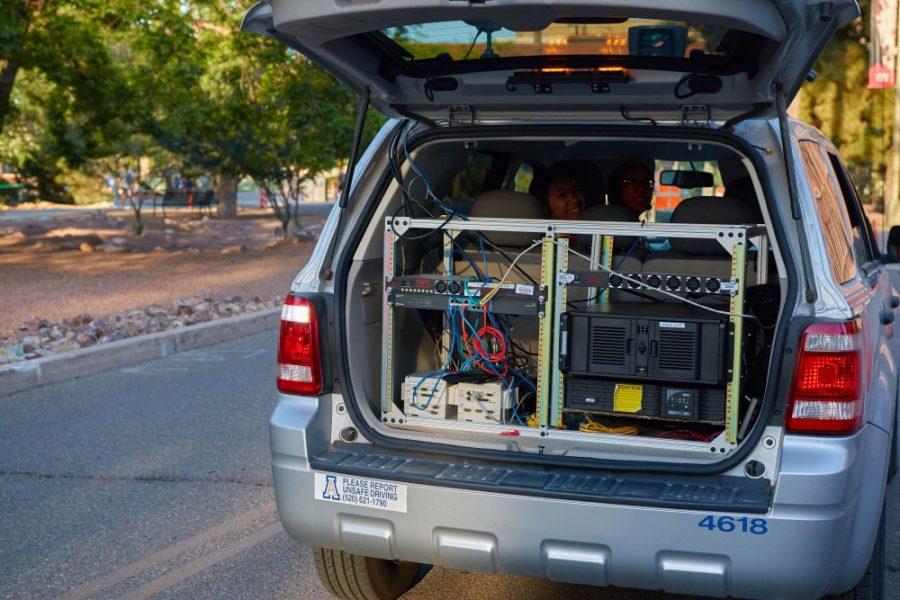There have been very few moments in time when transportation was radically and irrevocably changed across the entire world. From the invention of steam-powered trains, the introduction of cars and the globalization of airplanes, mankind has always aspired to revolutionize the way we move around. And it is beginning to seem like we are on the verge of another development that is ready to change the way we travel: self-driving cars.
These automated vehicles, also known as AVs, claim to offer a safer and more beneficial means of transportation. Tesla, a flagship company leading the way for more automated cars, advertises that their autopilot option can see and protect its passengers from dangers or obstacles over 800 feet ahead of the vehicle, and can cut down on lives lost to accidents and human error.
The potential benefits of automated vehicles are tremendous; If Tesla’s advertising is accurate, then thousands of lives could be saved, millions of dollars in damages avoided, and hours of time wasted in traffic would be cut down. In the United States alone, around 37,000 people die every year to accidents involving vehicles. An automated vehicle is designed to not get tired or distracted, both constant problems for drivers after long stretches of driving and a potential life saver for pedestrians and motorists.
Even more than the lives it could possibly save, The Economist reported that, “being electric, (AVs will) cut harmful emissions in places with clean grids”, and that as the AVs have built in systems for safe distances between cars and a more streamlined approach to dealing with changes in traffic, they also predicted that cities’ highways will be less clogged and easier to travel.
But the benefits of advancements in total self-driving cars can also be felt in partly autonomous vehicles being built every year by Tesla and other automation-heavy brands. Cars are now produced that help drivers stay in their lane, begin braking in case of a sudden emergency and alert you if you are close to backing up into an obstacle. These improvements in vehicle safety helps make our driving experiences better and our streets less dangerous, and are a sign of a changing market for cars.
If more and more brands begin to branch out into these advancements, then we could very believably see the rise of total or near-total automated vehicles in our lifetimes. Although Tesla is currently leading the pack, Toyota has already invested around one billion dollars in A.I. research to produce a driverless car by 2020, and according to Business Insider, Volvo is emphasizing development on semi-automated vehicles, wanting to make its cars “deathproof” for both passengers and pedestrians.
But the American public is just not buying into it. Even with stories of fully functioning automated vehicles being ready by this year, public opinion is very sharply against it in its current form. Only 22 percent of Americans reported being comfortable with self-driving cars, a percentage that is slightly below the average in Europe, but not by far, as even the comparatively open-minded European audience sits only at 30 percent in favor. That same poll also reported that Americans would be significantly more supportive of partially automated vehicles, such as parking assistance and autopilot on the highways, than totally automated vehicles.
So why don’t we trust it? For one, it is a complete change from what we are used to. Cars driving themselves means that those of us who enjoy driving just for the sake of driving have no reason to upgrade. That poll showed that over half of both Republicans and Democrats are “car enthusiasts,” meaning that even politics can’t get in the way of America’s love affair with our vehicles.
But the second reason is a lot more challenging to answer. These automated vehicles are a surprisingly new technology, and those of us who may not be entirely trusting of this big jump have reason to skeptical. Just last month Elaine Herzberg was struck and killed by an automated vehicle in Yuma during a trial run; a tragedy made worse by most people not even knowing that Uber was testing driverless cars in Arizona.
Emails sent from Arizona Governor Doug Ducey’s office showed that his administration had been supportive of the program from the beginning all the way back in 2015, and he gave a message through his spokesperson saying, “Allegations that any company has secretly tested self-driving cars in Arizona is 100 percent false. From the beginning, we’ve been very public about the testing and operation of self-driving vehicles, and it has been anything but secret.”
In the aftermath of the accident, engineers working on similar programs were not surprised. Mike Wagner, CEO of the software company Edge Case Research, was quoted as saying, “The argument is that the rate of accidents is supposed to go down, when autonomy is matured to a certain level. But how we get from here to there is not always entirely clear, especially if it needs a lot of on-road testing,” meaning it may be a bumpy, and potentially even tragic, road ahead.
But every year we spend pushing back automation or partial automation may cost even more lives, as developments made in these processes make driving safer and more accidents avoidable. These tests absolutely must be done with great scrutiny and under the watchful eye of the public to ensure that all precautions are made, but these tests must be continued. If we fall short we may lose more lives we could have otherwise protected.
Alec Scott is a Sophomore studying Political Science and German Studies who volunteered for the Ron Barber 2014 Congressional Campaign. Follow Daily Wildcat on Twitter.









